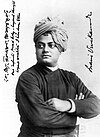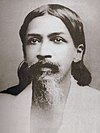Portal:Hinduism/Selected Hindu
| This page is currently inactive and is retained for historical reference. Either the page is no longer relevant or consensus on its purpose has become unclear. To revive discussion, seek broader input via a forum such as the village pump. |
| Note: Selected biography entries are now listed at Portal:Hinduism/Selected Hindus. However, this page should be retained for historical reference. |
Usage
[edit]The layout design for these subpages is at Portal:Hinduism/Selected Hindu/Layout.
- Add a new Selected Hindu to the next available subpage.
- Update "max=" to new total for its {{Random portal component}} on the main page.
Selected Hindus list
[edit]Portal:Hinduism/Selected Hindu/1
Rama (sometimes referred to as Ramachandra and also as Shri Rama) was a king of Ancient India whose grand story is portrayed in the epic Ramayana, one of the two great epics of India. In Hinduism, he is also considered to be the Seventh Avatara of Vishnu and one of the most important manifestations of God. He is one of the most popular heroes of Hindu mythology and folktales in South and Southeast Asia. Born as the eldest son of Kaushalya and Dasharatha, king of Kosala, he is the embodiment of Dharma. He is the hero of the ancient Hindu epic poem, The Ramayana (The Journey of Rama). Rama is the husband of Sita, who is also considered the Avatara of Lakshmi and the embodiment of perfect womanhood.
Portal:Hinduism/Selected Hindu/2
Swami Vivekananda (Bengali: স্বামী বিবেকানন্দ, Hindi: स्वामी विवेकानन्द) (whose pre-monastic name was Narendranath Dutta (Bengali: নরেন্দ্রনাথ দত্ত, Hindi: नरेन्द्रनाथ दत्त; January 12, 1863 – July 4, 1902) is considered one of the most famous and influential spiritual leaders of the Hindu religion. He was the chief disciple of Ramakrishna Paramahamsa and was the founder of Ramakrishna Math and Ramakrishna Mission. He is considered by many as an icon for his fearless courage, his positive exhortations to the youth, his broad outlook to social problems, and countless lectures and discourses on Vedanta philosophy.
Portal:Hinduism/Selected Hindu/3
Sri Aurobindo (Bengali: শ্রী অরবিন্দ; August 15, 1872–December 5, 1950) was an Indian nationalist, scholar, poet, Hindu mystic, evolutionary philosopher, yogi and guru. His followers further believe that he was an avatar, an incarnation of the supreme being.
Sri Aurobindo spent his life—through his vast writings and through his own development—working for the freedom of India, the path to the further evolution of life on earth, and to bring down what he called the Supramental Truth Consciousness Force to enable such progress. Aurobindo rejected the materialistic tendencies of both Darwinism and Samkhya, and proposed an evolution of spirit rather than matter.
Portal:Hinduism/Selected Hindu/4 A. C. Bhaktivedanta Swami Prabhupada (September 1, 1896–November 14, 1977) was born Abhay Charan De, in Kolkata, West Bengal. He studied at the Scottish Church College, Calcutta, which was then administered by the British. In his later years, as a Vaishnava sadhu, he became an influential communicator of Gaudiya Vaishnava Theology to India and specifically to the West.
He took sannyasa vows in 1959 from his Godbrother Sri Bhakti Prajnana Keshava Maharaja at Mathura, following which he singlehandedly published the first three volumes of his thirty volume translation of the 18,000 verse Bhagavata Purana and the commentary on it. He then left India to fulfill his master's spiritual mission. In his possession were a suitcase, an umbrella, a supply of dry cereal, about seven dollars worth of Indian currency, and several boxes of books.
Portal:Hinduism/Selected Hindu/5
Mohandas Karamchand Gandhi (October 2, 1869 – January 30, 1948) was a major political and spiritual leader of the Indian Independence Movement. He was the pioneer of satyagraha — resistance through mass civil disobedience strongly founded upon ahimsa (non-violence) becoming one of the strongest philosophies of freedom struggles worldwide. Gandhi is commonly known and spoken of worldwide as Mahatma Gandhi (Hindi: महात्मा, məhatma ; from Sanskrit, mahātmā: Great Soul) and is fondly called Bapu (in Gujarati, Father).
Gandhi first employed his ideas of civil disobedience in the Indian struggle for civil rights in South Africa. Upon his return to India, Gandhi helped lead poor farmers and laborers to protest oppressive taxation and widespread discrimination.
Portal:Hinduism/Selected Hindu/6 Vyāsa (Devanāgarī: व्यास) is a central and much revered figure in the majority of Hindu traditions. He is also sometimes called Krishna Dwaipayana, (the island-born) or Veda Vyasa '(वेद व्यास, veda vyāsa), meaning - 'the one who classified the Vedas'. He is accredited as the scribe of both the Vedas, and the supplementary texts such as the Puranas. A number of Vaishnava traditions regard him as an avatar of Vishnu. Vyasa is also considered to be one of the seven Chiranjeevin (immortals), who are still in existence according to general Hindu belief. Vyasa appears for the first time as the author of and an important character in the Hindu epic Mahabharata. It is traditionally held by Hindus that Vyasa categorised the primordial single Veda into four. Hence he was called Veda Vyasa, or "Splitter of the Vedas," the splitting being a feat that allowed the populace of the Kali yuga to understand the divine knowledge of the Veda.
Portal:Hinduism/Selected Hindu/7
Adi Shankara was a Hindu philosopher and theologian from India. He is the most renowned exponent of the Advaita Vedanta school of philosophy, from whose doctrines some of the main currents of modern Indian thought are derived. His works in Sanskrit discuss the unity of the Ātman and Brahman, the idea that there is interconnected oneness in all of existence, that eternal Truth is Ātman that is within every human being and all living beings. He wrote copious commentaries on the Vedic canon (Brahma Sutras, Principal Upanishads and Bhagavad Gita) in support of his thesis. Shankara also authored Upadesasahasri, his most important original philosophical work. His works elaborate on ideas found in the Upanishads. He also explained the key difference between Hinduism and Buddhism, stating that Hinduism asserts "Atman (Soul, Self) exists", while Buddhism asserts that there is "no Soul, no Self".
Adi Shankara died in the thirty third year of his life, and reliable information on his actual life is scanty. Various texts state that Shankara travelled extensively across the Indian subcontinent to propagate his philosophy through discourses and debates with other thinkers of competing Indian philosophies. He established the importance of monastic life as sanctioned in the Upanishads and Brahma Sutra, in a time when the Mīmāṃsā school established ritualism and ridiculed monasticism. He is reputed to have founded four mathas ("monasteries"), which helped in the historical development, revival and the spread of Advaita Vedanta school of Hinduism. He is also credited with initiating the Kumbh Mela – one of the world's largest periodic religious pilgrimages.
Adi Shankara is believed to be the organiser of the Dashanami monastic order and the founder of the Shanmata tradition of worship. He is also known as Adi Shankaracharya.
Portal:Hinduism/Selected Hindu/8
Sivaya Subramuniyaswami (1927 - 2001), affectionately known as Gurudeva by his followers, was born in Oakland, California on January 5, 1927. He established a Hindu monastery in Kauai, Hawaii and founded the magazine Hinduism Today. The author of many books on Hinduism and metaphysics, Subramuniyaswami was one of the most prominent faces of Hinduism during the last two decades of the 20th century. He was one of Shaivism's most orthodox and revered Gurus, the founder and leader of the Saiva Siddhanta Church, world's first Hindu church. Born with the name Robert Hansen in California in 1927, as a young man of 20, in 1947, he journeyed to India and Sri Lanka in search of his guru. Two years later was initiated into sannyasa by the renowned siddha yogi and worshiper of Shiva, Jnanaguru Yogaswami of Sri Lanka.
Portal:Hinduism/Selected Hindu/9 Madhvacharya (1238-1317) was the chief proponent of Tattvavāda (True Philosophy), popularly known as Dvaita or dualistic school of Hindu philosophy. It is one of the three most influential Vedanta philosophies. Madhva was one of the important philosophers during the Bhakti movement. He was a pioneer in many ways, going against standard conventions and norms. Madhvacharya is believed by his followers to be the third incarnation of Vayu, aka Mukhyaprana, after Hanuman and Bhima. Madhva's Dualistic view, along with Shankara's Advaita or Nondualism and Ramanuja's Qualified Nondualism,or Vishishtadvaita form some core Indian beliefs on the nature of reality.
Portal:Hinduism/Selected Hindu/10
Sri Ramakrishna Paramahamsa (Bengali: রামকৃষ্ণ পরমহংস Ramkrishno Pôromôhongsho), born Gadadhar Chattopadhyay (Bengali: গদাধর চট্টোপাধ্যায় Gôdadhor Chôţţopaddhae), (February 18, 1836–August 16, 1886) was a Hindu religious teacher and an influential figure in the Bengal Renaissance of the Nineteenth century. His teachings emphasized God-realization as the highest goal of life, love and devotion for God, the oneness[disambiguation needed] of existence, and the harmony of religions.
Portal:Hinduism/Selected Hindu/11
Jagadguru Rambhadracharya (Sanskrit: जगद्गुरुरामभद्राचार्यः, Hindi: जगद्गुरु रामभद्राचार्य, IAST: Jagadguru Rāmabhadrācārya, Sanskrit pronunciation: [ɟəɡəd̪ɡuru rɑːməbʱəd̪rɑːcɑːrjə]) (1950–), born Giridhar Mishra (IAST: Giridhara Miśra), is an acclaimed scholar, educationist, polyglot, composer, orator, philosopher and Hindu religious leader based in Chitrakuta, Uttar Pradesh, India. He is one of the four incumbent Jagadguru Rāmānandācāryas (leaders of the Ramananda monastic order), and has held this title since 1988.
Portal:Hinduism/Selected Hindu/12
Portal:Hinduism/Selected Hindu/13
Portal:Hinduism/Selected Hindu/14
Portal:Hinduism/Selected Hindu/15
Portal:Hinduism/Selected Hindu/16
Portal:Hinduism/Selected Hindu/17
Portal:Hinduism/Selected Hindu/18
Portal:Hinduism/Selected Hindu/19
Portal:Hinduism/Selected Hindu/20
Nominations
[edit]Feel free to add Featured, top or high importance Hindu mythology, Hindu philosophy, or Hinduism Hindus to the above list. Other Hindus may be nominated here.
Current nominations
[edit]Choose the next "Selected Hindu":








